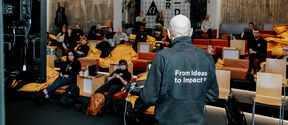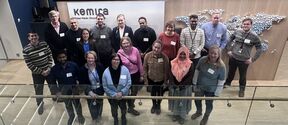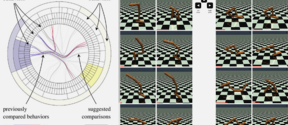Oops: A curious discovery

‘I was doing my master’s thesis when I learned about a summer project that seemed interesting. I wanted to expand my knowledge, so I applied for it.
The idea was to add charge-carrying agents to a ferrofluid – making what we called an electroferrofluid – and then study its behaviour in electric and magnetic fields. We were looking for certain behaviours, like self-assemblies of nanoparticles.
The experiments didn’t seem to be working, and it looked like we had failed. We couldn’t see what we were looking for. Instead, we saw some instabilities in the system that made it difficult to reach our goal.
Some others on the team had worked on other electric-field phenomena for another project, which gave us the idea of trying the electrode setup from those experiments. We thought that might simplify the system and generate simpler and more well-defined nanoparticle structures. We already had everything in the lab, so we tried it out of curiosity.
Something interesting happened. We started seeing various instabilities and dynamic pattern formations at a different scale than we were expecting. The first time I saw them, I was really fascinated and had some happy tears in front of the microscope.
It was a new phenomenon – that we had discovered! We decided to study the instabilities and patterns instead of trying to remove them. I looked forward to going to lab and exploring the system every day; I did so many experiments over the following weeks to test out different parameters and try to understand the patterns and how they formed.
We hadn’t expected that adding nanoparticles would lead to new complex behaviour or a whole new pattern formation system in ferrofluids. We’d been trying to do something else, but now this has opened up a whole new area of research. I decided to change my master’s thesis topic and study this system instead, and it has fascinated me ever since.
I think it’s important to always think outside the box and just explore. It’s good that research has certain structures, but when doing experiments, I’m always wondering about other things we could do. I often have a curious and playful approach.
I learned to not get disappointed when an experiment seems to fail and instead change my perspective and ask different questions. This journey has been the most exciting time of my career, and I enjoyed it so much that I’d like to pursue research in the future. Curiosity can go a long way.’
Text: Sedeer el-Showk
Photo: Nita Vera
This article has been published in the Aalto University Magazine issue 32, April 2023.
Read more news

Training available in AI, research data management, research ethics + more – register now!
New topics included! Registrations for spring 2026 are open.
New Innovation Postdoc programme launching this spring in Aalto
Innovation Postdoc launching this spring for AI researchers eager to turn cutting-edge research into real-world impact.
Kemira Hosts TexirC Results Meeting
Kemira hosted the results meeting of the TexirC project on February 3, 2026.






